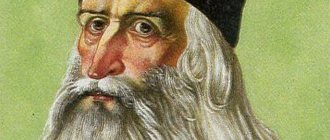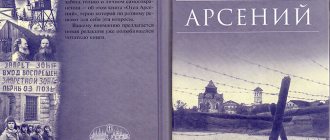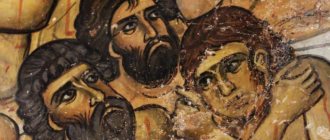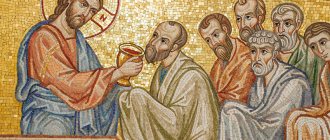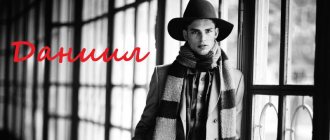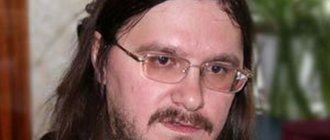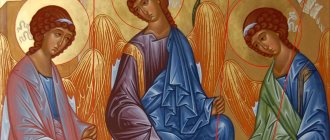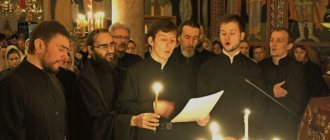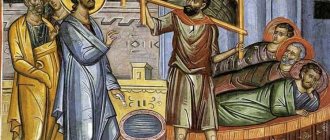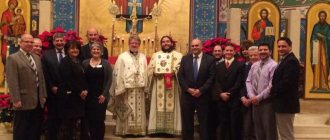A Russian proverb says: “God extend the century by forty forty.” In everyday life, this expression is rarely used and is considered an outdated phraseological unit. But thanks to the creation of a public organization of the same name, which has existed for five years, this expression has received a second life.
What does the phraseological unit Forty forty mean?
Modern researchers put different meanings into this phrase. Some of them believe that this number has an indefinitely large meaning, like the phrase “darkness.” Others are inclined to understand literally “40 times 40,” that is, the number 1600. Still others suggest that this is a non-standard system of counting in forties that appeared from nowhere.
Some researchers are inclined to believe that the word “forty” means a church administrative-territorial unit - “elderhood”, “church deanery”. This division was established by decree of the Stoglavy Council of the Russian Orthodox Church in 1551.
According to him, seven Moscow deaneries were formed, which were figuratively called forty:
- Kremlevskoe;
- Sretenskoe;
- Nikitskoe;
- Kitaygorodskoe;
- Zamoskvoretskoe;
- Ivanovskoe;
- Prechistenskoye.
Every forty had a main church (parish), led by a priestly elder. One deanery included no less than forty parishes. In other words, this expression was used to denote the number of churches in Moscow, despite the fact that there have not been such a number of churches in Moscow in its entire history, even if we count not only churches, but also the altars of churches.
It was not by chance that the public Orthodox organization chose this name. According to one of the founders of the Movement, “the original meaning of this phrase is the multitude, multitude of the army of Christ.” Although most associate this name with the number of Moscow churches.
Forty Forty Movement
To increase the number of churches, the Moscow Church Construction Support Fund was created in 2010. The “200 Temples” program was conceived to provide densely populated areas of the capital with temples within walking distance. The start date of the program is April 29, 2011.
Two years later, the public Orthodox movement “Forty Forties” was born as a response to the information campaign to discredit the Russian Orthodox Church (ROC) in 2012, as well as to the Pussy Riot scandal. At this point, the movement saw itself primarily as advocates for new temple construction as part of the 200 Temples program.
Goals and objectives
The “Forty Forties” (DSS) movement unites people of the Orthodox faith with an active civic position.
The goals set by the creators of the movement are extremely simple:
- Defense of the Russian Orthodox Church.
- Protection of the rights and freedoms of Orthodox Christians.
- Protection of traditional Orthodox values for the greater Russian world.
The movement also directs its activities to attract passionate Orthodox youth.
The main tasks that the DSS sets for itself:
- Assistance to the Russian Orthodox Church in the implementation of the patriarchal program “200 churches” in the city of Moscow, as well as assistance to Orthodox communities that, for some reason, were not included in this program, but wish to build a Temple for their parish.
- Promoting a healthy lifestyle within the framework of the “Orthodoxy and Sports” direction.
- Destruction of myths about Orthodoxy as a “religion of the weak”, which has supposedly exhausted itself ideologically.
Today the Movement has grown and is implementing a large number of areas and projects.
Ideology of the organization
The leaders of the movement are convinced that against the backdrop of ideological, economic and demographic collapse, the country’s territory is disintegrating and its position in the international arena is humiliating. The times of atheism have passed, but the crisis of consciousness remains: Orthodoxy is still considered something peripheral to the life of the country.
Orthodox Christians in Russia are a very large social group, ready to defend their vision of the model of the future (the civilization of God), which is based on spiritual and moral values. The founders of the DSS are confident that Russia can only exist as an Orthodox country, because only Orthodoxy should be the foundation that unites many nationalities and confessions.
The ideologists of the organization “Forty Forties” believe that the deep cause of national disasters is the breaking of the union with God, which was concluded by our people a thousand years ago. The restoration of this union, the return of His commandments to public life will not only stop self-destruction within the country, but also offer the whole world a project for the future, which is based on the ideal of the God-man that Christ showed us.
The world community perceives Russia as the last stronghold of traditional conservative values, which are based on the commandments of the Gospel. Therefore, all Christians in our country must stand in defense of Orthodox values and strive to preserve Russia as our ancestors left it, with its thousand-year history and culture.
According to the leaders of the DSS, in the next decade our state will face a deep demographic hole. In the coming years, the number of women of reproductive age will decrease, as a result of which the number of newborns will also fall (by at least 40% from the current level). At the same time, the economically active population will decrease by 10 million people by 2025. If in 20 years the number of large families in Russia does not increase from 7 to 50%, then by the end of the century civilization will disappear along with its bearers. Stopping the extinction of the people and preserving Russia as a country, state, and civilization is a fundamental task that must be realized and solved. Without returning to Orthodoxy, Russia will die out. In fact, the question is already stark: Orthodoxy or death.
Andrei Kormukhin: “We need to be saved by a “gang””
On June 1, the social movement “Forty Forty” celebrated its two-year anniversary. During this time, it united more than 10 thousand people and became, without exaggeration, one of the most influential in the Orthodox community. What allowed the movement to gain such wide recognition, what goals it sets for itself – Andrei Kormukhin, coordinator of the “Forty Forty” movement, spoke about this and much more:
Go beyond the fence
Andrey Kormukhin
“We arose not because some circular was issued from above or because someone initiated the creation of the movement, it’s just that people have finally matured in order to revive what was destroyed during the 70-year period of the communist regime and the timelessness of 1990.” -s. We have a thousand-year Orthodox history behind us, and now we remember this. We realized that we could no longer live within the confines of a church fence or some kind of Orthodox reservation that was formed during the Soviet years. In the 1990s, in all spheres of public life - in culture, education, politics, art - a certain kind of elite appeared, which formed the image of a kind of Orthodox marginal in the mass consciousness. The main messages of that time: the biblical project is completed, Russia is facing new discoveries and achievements, we have a secular state, do what you want within your church walls, but just don’t leave it.
– The movement appeared in 2013, which suggests that it was apparently born as a response to the information campaign to discredit the Russian Orthodox Church in 2012?
- Yes exactly. When information attacks on the Patriarch began, the scandal with Pussy Riot occurred, it became clear that the time had come for Orthodox Christians to finally go outside the church fence and stand up for their faith.
Andrey Kormukhin and the Forty Forties movement
We have not yet overcome the crisis of consciousness, when Orthodoxy is considered something peripheral to the life of the country
Do you remember what scandals there were when the draft course on Orthodox culture in educational institutions was presented? All the media then burst out with phrases: “The Church is again meddling in the educational field!” But in fact, no one imposed this course. They just wanted to convey that our country has an Orthodox foundation, an Orthodox history of all victories, and now we are losing it all. Even in the Great Patriotic War we won because the national spirit awoke. When we realized that we were fighting not with the Germans, not with the fascist coalition, but with evil, then this great Victory became possible. Now historical facts are already being revealed, how during the war Stalin addressed people not as “comrades”, but as “brothers and sisters”, how churches were opened. It just became clear that the chimera could not be defeated. This chimera eventually collapsed in 1990, when, again, abandoning Orthodoxy, it tried to drive people into the communist project. The times of atheistic power are long gone, but we have not yet overcome the crisis of consciousness, when Orthodoxy is considered something peripheral to the life of the country. Why do we have to constantly make excuses for our worldview, for our activity? “Forty Forties” is our attempt to overcome this crisis. We have decided to stand in defense of Orthodox values and will strive to preserve Russia as our Orthodox ancestors left it for us - with its thousand-year history and culture.
How the puzzle came together
– Tell us how the movement started.
– In 2013, at the dawn of our development, we saw ourselves, first of all, as defenders of the construction of new churches built under the “200 churches” program. We met many of the guys who were at the origins of the movement at events related to the protection of construction sites. There was a terrible attack on this program, and it was planned and very well financed. When we saw like-minded people, we realized that we needed to act. At first they wanted to do this point-by-point - to choose one temple and defend its construction. As a result, to date we have helped, to one degree or another, 15 Orthodox communities in Moscow find their churches. And this activity continues.
– The “Forty Forties” movement, one might say, burst into the information space and the Orthodox world. In just two years, 10 thousand people have already joined it...
– We do not associate this with any of our talents or organizational abilities. To a greater extent, we developed according to the will of God and not because of something, but in spite of it. When everything was falling apart for us, when it seemed that it was impossible to do anything, suddenly the puzzle, which seemed to be disassembled, at a certain moment came together, and everything worked out. And, to our joy, people threw up their hands and said: “Yes, well done, guys.” But we understood that we were not the good guys. And, again, I think, by the will of God, the challenges were correctly formulated, and we became clear.
Our main message: Russia can only exist as an Orthodox country. People heard this and followed us.
Our main message: Russia can only exist as an Orthodox country. People, having heard this, followed us, began to join the movement and take an active part in our events and actions. I’ll be honest: we didn’t expect such a flow of people and were a little confused. We felt for ourselves what “growing pains” are. But then they realized what to do and began to form a structure, a management and coordination system. As a result of these transformations, we turned from a brotherhood into a movement.
Orthodox code
– You defend the construction of new churches, hold Sorochinsky meetings with famous Orthodox people, the clergy, assist in ensuring order during patriarchal services, collect humanitarian aid for the residents of Donbass as part of the program “From Temple to Temple! From soul to soul!”, accompany believers arriving to worship Orthodox shrines, organize sports events and much more. But what results of the movement do you consider the most significant?
– If we were talking to you a year ago, I would say that this is support for the construction of new churches in Moscow and the formation of an active wing in the Orthodox community that is ready to stand up for the faith and for the Fatherland. Now I see everything more widely.
I have 9 children, and I care what country my children will grow up in
I have 9 children, and I care what country my children will grow up in. Russia must recognize itself as an Orthodox power, in which Orthodoxy must be the foundation that unites many nationalities and many confessions. After all, there is no enmity between people of different faiths who have inhabited our country from time immemorial. It was Orthodoxy that made it possible to preserve all this. We did not slaughter a single people, as was the case in some supposedly Christian countries, and did not allow ourselves any cultural expansion into territories that adhered to their own culture. We were simply suggesting. If we take our northern lands, then at first it was not warriors who went there, but priests and missionaries. Let's even take the Caucasus. He has always been predominantly Muslim. Yes, we fought with them, but we did not fight for faith. It’s just that at a certain point we were tired of the fact that people were taken into slavery and the carts were robbed. It was necessary to put these territories within a cultural framework. In principle, nothing has changed now. Look what Vladimir Vladimirovich did in the early 2000s in Chechnya. Ask them: was it better for them to live “under Basayev” at that time or “under Kadyrov” today?
– There is a study that is conducted almost every year - the “Happiness Index of Russian Cities” - and, oddly enough, Grozny almost always takes first place in the ranking...
- Nothing strange. They are happy because their landmarks are set correctly. We, having an Orthodox cultural code, are still trying to renounce it. This is the same as taking a gas mask away from a person in a vacuum and saying: “Breathe.”
There is no synergy
– How do you generally assess the level of social activity of Orthodox people?
- He is different. In general, our Orthodox field is just beginning to form. Until today, there were several institutions and structures that were Orthodox, but they worked on different planes, with different audiences. The reason for this disunity was the events of the 20th century, when the Church, for objective reasons, became somewhat atomized. There were very few parishes, but each of them was a separate, closed world for its parishioners. As a result, today we have the concept of a parish, a rector, a confessor, but there is no concept of the Orthodox world, conciliarity. At least it wasn't until recently. For every Orthodox Christian, the interests of his parish and spiritual father are higher than the interests of the entire Orthodox world. Moreover, there was even some kind of rivalry: “each sandpiper praised his swamp.” This is due to the fact that there simply were not those challenges that would concern each individual parish. But now there is a threat to Orthodoxy as a whole as a civilizational code. And now we remembered that we need to be saved as a “gang,” and finally began to slowly unite, regardless of who our confessor is and what parish we are in.
– What is the driving force behind the process of unification of the Orthodox?
– The main driving force now is Patriarch Kirill. He has a good sense of time. Hence his some criticism towards missionaries and educational institutions, which should be catalysts for this process. All Orthodox organizations must unite. There is such a fashionable word “synergy”. So, now there is no Orthodox synergy. But only it can make us a civilizational project again - although we are one, we don’t realize it yet. Russia cannot exist outside of Orthodoxy. It will either simply perish, or there will be some scattered states, republics, or it will become an Islamic project, and maybe even a colony of America. In our country, from 75 to 80% say that they are Orthodox and associate themselves with them. At the same time, only 5% are churchgoers. When we cross the threshold of 20–30% of those who are churched, then this moment of synergy will begin; now, individually, it is very easy to “click” us.
75% of Jews, 70% of Protestants and only 5–10% of Orthodox Christians want to leave Russia
It is also important to understand that we simply will not survive as a civilization any other way. All political science theories today say that peoples can survive only if they implement a civilizational project, the number of people in which is at least 300 million. America can be called a separate civilization, China can be called a separate civilization, even the European Union can be a separate civilization. We, with 145 million people, even if we count Kazakhstan with 14 million and Belarus with 9 million people, cannot count on this. God willing, if we reach 200 million. What civilizational code would allow us to enable survival mechanisms in a global sense? Only Orthodoxy. Only it can give us strong families with many children, and not 80 divorces for every 100 marriages. Only it can give us true patriots. Not long ago there was a survey among Russian youth of different faiths on the topic of migration. The result is approximately the following: 75% of Jews, 70% of Protestants and only 5–10% of Orthodox Christians want to leave Russia. Everything is explained simply: how can one leave a God-given country?
Salvation in humility?
– Some believe that actively expressing oneself in public life is not entirely acceptable for a believer, since humility is often at the forefront of believers...
– Well, firstly, we need to remember the history of Orthodoxy, secondly, the history of Russia and, thirdly, the history of the Russian Orthodox Church. We all know the notorious dispute between supporters of the positions of Nil Sorsky and Joseph Volotsky, who lived at the same time. One called for salvation through asceticism, and the other argued that an Orthodox person should equally be both a man of prayer and a statesman. In this regard, we can recall the eternal dispute between Orthodox patriots and Ouranopolitans, who say that we are all brothers throughout the world. Yes, we are all brothers, but we have a homeland - Russia. God grant that we have just such disputes.
Venerable Joseph of Volotsky and Nil of Sorsky
As for humility, I’ll answer the question with a question. Could a state appear that occupies 1/6 of the landmass if all the inhabitants of this state simply humbly prayed all this time? There are spiritual challenges, when each person individually saves his soul, and there are social challenges, when your state, your loved ones, your family are attacked.
A warrior of Christ must be irreconcilable to the insults of the state, family, faith, loved ones, and the weak.
In this regard, I liked the statement of Archpriest Andrei Tkachev, voiced by him at our Sorochin meetings. Its meaning boils down to the following: if they hit you on your left cheek, turn your right cheek and you will receive grace; if you hit a weak person in front of you, break the offender’s jaw, and there will be even greater grace. A person must be humble regarding his sins, but regarding offenses against the state, family, faith, loved ones, and the weak, he must be an irreconcilable warrior of Christ.
– Speaking of warriors. Today, many strive to raise children as patriots, so that they serve both God and the Fatherland. But what is patriotism?
– If for you Orthodoxy and faith are of paramount importance, if you are a Christian, then for you patriotism plays with those colors that allowed us to become 1/6 of the land. If you are a liberal and at the same time a patriot, then you will want Russia to become a European power with liberal values, so that same-sex marriages and the like can be concluded. This is a trap that is very easy to fall into. We are all patriots now, but for everyone this concept is filled with different meanings. I am sure that we cannot put our homeland above God, because we were created by God the Father. The attitude towards the homeland as God’s creation is correct. Only in this case will you defend it as the country given to you by God. And if you don’t have God, then a vinaigrette begins: everyone fights for their homeland, everyone has their own homeland.
Patriotism and youth
– In many cities of Russia today, clubs, squads, brotherhoods and other youth structures are being created, which are called military-patriotic and Orthodox-patriotic. What are their features and differences from each other? What would you, as a father of many children, advise parents to consider and know when choosing such a club?
– What to choose depends on the position of the parents. For example, the military-patriotic name is closer to me, because the military component is important for children. They come there to learn how to be warriors. However, given that we are a country where the majority of the population considers themselves Orthodox, these military-patriotic clubs should a priori be Orthodox. In the clubs there must be a priest who will read a prayer, instruct the children, and tell about the holy warriors: Alexander Nevsky, Dmitry Donskoy, Fyodor Ushakov, St. George the Victorious, Dmitry Thessalonica, and the forty Martyrs of Sebaste. After this, children will begin to correctly perceive military feats. We need to convey to them that a warrior is not one who goes to kill people, but one who goes to defend his homeland, his people, his faith and his family.
It is the realization that we are with God that makes us happy. And in the Gulag, and in war, and even in misfortune
Correct value guidelines are also very important in educating young people. Most recently, I gave a lecture for young people at the “Spiritual Unity” forum, which took place in Tula. I asked the guys two banal questions: which of you wants to be happy, and what does it mean to be happy? Of course, the answers were expected: everyone wants to be happy, and everyone’s concept of happiness is approximately the same: material wealth, a happy family, professional self-realization. “What if the house burns down, the wife leaves and there is no job? – I asked. “Will the person become unhappy?” But every person strives for happiness. How to be? You need to set a goal that cannot be achieved for a long time. If you set yourself easily achievable goals, then after you achieve them, devastation arises, and not everyone can psychologically cope with it. Happiness does not lie in Mercedes, dachas, villas and islands. After all, as soon as you buy yourself, for example, a 50-meter yacht, you start thinking about a 100-meter one. And we, Orthodox people, are a priori happy. Every Orthodox person sets himself the goal of saving his soul. And he builds his whole life according to this goal. That’s why we are happy in the Gulag, happy in war, and happy even in misfortune. It is the realization that we are with God that makes us happy.
Page of Patriarch Kirill on the social network VKontakte
– Not long ago, Patriarch Kirill called on the clergy to more actively use social networks in conveying the word of God. At the same time, he set an example by opening his official page in “Elitsa”, as well as in secular social networks. What do you think this will do for the Church?
– The fact that His Holiness appeared on social networks is undoubtedly the right move. And the fact that the bot attacks that we are seeing on VKontakte began is also inevitable. However, closing the ability to comment, as many suggest, is not entirely correct. A page closed for comments is of no interest. And for His Holiness this is important because he must see a real popular reaction to publications related to his activities. Therefore, of course, the fact that in Elitsy the patriarchal page is not closed and at the same time there is not all the negativity that is on VKontakte makes it more convenient and safe for Internet users. And the fact that the bishops’ pages are also “attached” to it will allow people in the regions to keep abreast of affairs both locally and in the country as a whole. As far as I know, there is no such functionality in other social networks. In addition, I see great prospects in the Orthodox social network specifically for working with young people, and I think that soon we will evaluate all these opportunities in practice.
– Andrey, recently another serious problem has appeared. Now there is a competition between Orthodoxy and paganism for youth. This has already acquired the character of some kind of competition for “who is cooler.” Even the well-known boxer Alexander Povetkin, being a baptized man, became an adherent of neo-paganism. In your opinion, why is this happening, what are the threats of the passion for neo-paganism? How can young people who have not yet come to God recognize neo-paganism in time and not go down the wrong path?
– Neopaganism is technology. Moreover, it is pure destructive technology. It was launched in order to tear the Russian world apart from the inside. Let's remember what happened in the early 1990s. Many religious projects descended on Russia: Protestantism, Scientology, Jehovah's Witnesses. Yes, some people ended up in sects, but in general, given that Russian people still have an Orthodox code, all these sects began to gradually be rejected by society. They were either banned by the state, or they closed, or went underground. But paganism included other codes, which is why it is dangerous. They essentially made a substitution of concepts: the gospel principle was replaced by a national, ethnic one, which implies that tribal blood is higher than the Blood of Christ. At the same time, they say that Orthodoxy is good, it is the faith of our ancestors. It turns out that a person can declare himself a Christian, but in practical life be a pagan.
Photo: AP/Sergey Ponomarev
Neopaganism is technology. It was launched in order to tear the Russian world from the inside
This technology is not new: when it is impossible to break it from the outside, you need to do it from the inside. And then everything is simple: they found certain forces, in the person of the same Povetkin, and launched a massive information attack. They managed to find a similar conceptual framework for young people. Moreover, their target audience is football fans, young people who are interested in sports, computers, gadgets and, for the most part, do not read books. The development of clip thinking has led to the fact that a certain part of young people simply stopped thinking. And so clear and simple messages of a poster nature are thrown in for them, such as “My God did not call me a slave.”
Every person seeks God, especially a Russian person who has such a background - the 1000-year history of Orthodoxy. And at the same time, everyone wants to remain independent in making decisions. Paganism is very convenient in this regard. You can sin, not strive to get rid of your sin and still remain a believer. Therefore, again, this guy with glasses, whom the priest entrusted to head the youth department, will not be able to go to the rocking chair and say: your gods are just idols, cut down in the forest by the carpenter Uncle Vasya, and the history of Christianity in Rus' is a civilization equal to which is practically non-existent.
Children have always been and will be the key to family happiness. I am a very happy person!
– Andrey, I would like to touch upon such an important issue for young people as starting a family. You have already announced these terrible data: for every 100 marriages, there are 80 divorces. How did you come to create a large family? What advice would you give to young people?
– Even as a child, I told my parents that when I grow up, I will have three children, because there should be a lot of Russians. I didn’t set myself the goal of having many children; it’s just impossible to live an Orthodox life any other way. How many God sent, as they say. I would advise young people to be happy. There is great happiness - to be an Orthodox person, and there is small happiness - family. Children have always been and will be the key to family happiness. At the same time, one child is one happiness, two children are two happiness, and nine children... In a word, I am a very happy person!
Community history
“40 Sorokov” is a social movement consisting of Orthodox Christians, but open to everyone who seeks to defend the Fatherland and traditional spiritual and moral values. It unites people of different professions and social status, who have united around the New Testament and strive to be Orthodox not only in words, but also in deeds, following the example of the outstanding heroes of our history. The movement became widely known through the events in Moscow's Torfyanka Park and the protests against the film Matilda.
Organization and creation
The initiators of the movement were composer Andrei Kormukhin and boxer Vladimir Nosov.
The movement was first called “Hammer,” but received a new name when its creators found their “niche”—protecting the construction of churches under the “200 Temples” program.
According to one of the initiators of the creation of the DSS, Andrei Kormukhin, “the time has come for Orthodox Christians to finally go outside the church fence and stand up for their faith. People followed us, began to join the movement and take an active part in our events and actions.”
Kormukhin claims that the activities of the DSS became their own initiative. Individual church rectors asked them to guard construction sites, but in the end, force support was approved by the Russian Orthodox Church.
According to Kormukhin, joining the movement is quite difficult:
“You need to prove yourself for a long time.”
New members are accepted into the movement collectively. Participants in the movement are required to wear T-shirts of certain colors and with special stripes.
To date, there are no accurate statistics of those who have joined the ranks of the DSS. Andrei Kormukhin claims that the organization has several thousand supporters, and VKontakte subscribers are more than 22 thousand people.
Further fate
A year after its creation, in the summer of 2014, the “demand” of the young organization became clear, and it experienced a massive influx of new members, consisting mainly of religious athletes.
Until a certain point, the basis of the movement was the brothers. But time passed, and tasks that primarily required male participation began to alternate with tasks that were more suitable for women. Soon the decision was made to open a sister wing of the organization.
The sisterhood is engaged in the following areas:
- volunteering;
- charity;
- trade fairs;
- master classes;
- work with orphanages, orphans and other socially vulnerable groups of people.
Over the five years of the existence of the DSS, with their direct participation, 15 churches in Moscow have been built or are under construction.
In February 2014, activists organized a “patriarchal anti-Maidan” - an action near the Cathedral of Christ the Savior in honor of the fifth anniversary of the enthronement of Patriarch Kirill (about four thousand people walked around the temple holding hands).
In November 2014, Patriarch Kirill, at a meeting with Orthodox youth, called the volunteers who surround him “his guard.”
In February 2015, Patriarch Kirill personally congratulated Andrei Kormukhin on his birthday and asked him to “strengthen and multiply the ranks of the movement.”
In May 2015, supporters of the movement attacked the Moscow gay pride parade.
In June 2015, a picket was disrupted on Vorobyovy Gory against the installation of a monument to Prince Vladimir there.
At the end of June 2015, “40 Magpies” fighters were invited to guard construction materials for the temple being built in the capital’s Torfyanka Park. However, by that time protests had already begun in the park. The construction of the church was opposed by local residents, who were supported by opposition parties. It was during the events in Torfyanka Park that it became clear that there were many football fans in the movement. The leadership explained that there are different people in the organization - “both football fans and Nazis, but we pull out these problem guys and through Orthodoxy we make them different people.”
On August 21, 2015, State Duma deputy from the Communist Party of the Russian Federation Valery Rashkin turned to the FSB with a request to investigate the activities of the Movement and liquidate it.
“This organization actively interacts with radical extremist groups, including radical groups of football fans. In fact, this organization itself is a radical formation engaged in combat training of its members, many of whom adhere to neo-Nazi ideology,” the statement said.
The appeal remained unanswered.
In September 2022, the Orthodox social movement organized the all-Russian action “Stop Matilda!” in the form of pickets, religious processions and prayers for the royal martyrs, in which about a thousand people took part throughout Russia. According to the protesters, the film “Matilda” should be banned, as it threatens national security, destroys families and falsifies history.
In November 2022, an anti-abortion action “Stop the meat grinder!” was held at the entrance to the State Duma of the Russian Federation, which ended with the detention of the movement’s leader, Andrei Kormukhin.
Current situation
The activities of the DSS are accompanied by conflicting reviews, including sharply negative ones. Critics say there have been repeated incidents of violence by members of the movement.
According to critics, the DSS is a typical neo-fascist organization that covers up swastikas with icons and banners. Former and current football fans, far-right skinheads and other similar audiences flock here. “A sort of army of Mr. Gundyaev’s guardsmen, ready to crush someone’s skull for the ‘cause of Christ’.” It is no coincidence that its members shorten the organization’s pompous name to SS and wear T-shirts in the colors of the flag of Nazi Germany. Their main occupation is guarding events with the participation of the Patriarch, paving his way through the crowd. By special order - “protection” of construction sites, intimidation of protest activists.
To date, the DSS has opened branches in the regions, covering, in addition to Moscow and the Moscow region, such large Russian cities as:
- Saint Petersburg;
- Omsk;
- Novorossiysk;
- Ekaterinburg;
- Krasnoyarsk;
- Petropavlovsk-Kamchatsky.
In addition, there are branches of the movement in Serbia, Montenegro, Transnistria, and Austria.
The activities of the Movement were marked by letters from the Moscow Government, the Russian Orthodox Church and the personal attention of Patriarch Kirill. DSS has made a great contribution to the youth ministry of the Church and to creating an example of a healthy, athletic lifestyle for young people.
Performance evaluations
The activities of Andrei Kormukhin and the movement he leads are assessed extremely differently.
Patriarch Kirill, among others, expressed his assessment of Andrei Kormukhin’s activities, who personally presented him with a gift for his 45th birthday - an icon of St. Nicholas the Wonderworker, and also thanked the participants of the “Forty Forties” movement for their activities[16].
| This section is not completed. You will help the project by correcting and expanding it. |
Social and political activities
Cultural and sports spheres
The movement regularly organizes and conducts events to improve the cultural and educational level, as well as to promote a healthy lifestyle.
Traditional events held by the DSS:
- Sorochensky meetings are held weekly at the Novospassky Monastery with the participation of prominent representatives of the clergy, public figures and athletes.
- The annual festival “Orthodoxy and Sports” attracts an increasing number of participants and guests, and is rightfully considered a national festival. Its goal is the spiritual, moral and physical development of youth.
- Monthly sports tournaments “Orthodoxy and Sports” held in the cities of the Moscow region.
- Marathon "40x40".
- “Sober New Year” campaign.
- Project to support a healthy lifestyle “Murom Path”.
Humanitarian assistance
It is carried out in the following areas:
- Help the homeless. Daily feedings take place at Kievsky and Yaroslavsky railway stations.
- The charity project “From Prison to Light” provides assistance and visits to those in prison. Providing children born in custody with the necessary material support. Spiritual support for people who have stumbled.
- As part of the campaign “From temple to temple! From soul to soul!” The organization provides humanitarian assistance to the residents of Donbass and children of Syria.
Help for pilgrims
The youth department of the Moscow city diocese has repeatedly expressed gratitude to the Movement for accompanying believers arriving to worship Orthodox shrines.
DSS provided assistance to pilgrims during their stay:
- in the St. George Church-monument to the right hand (right hand) of the Holy Great Martyr George the Victorious, delivered from Athos to Moscow for the 70th anniversary of the Victory over fascism;
- in Moscow, parts of the relics of St. Nicholas.
Participants in the movement accompanied the Gifts of the Magi in Moscow, St. Petersburg, Volgograd and Kyiv (the trip to Kyiv was at the height of Euromaidan).
Organization of events
Every Monday, Sorochen tea parties are held in the refectory of the Vysoko-Petrovsky Monastery, where brothers and sisters, participants and supporters of the movement meet. At these meetings, anyone can get acquainted with the participants of the DSS. Here, new projects of the movement are discussed, relaxed communication takes place between brothers and sisters in Christ, birthdays are celebrated or loved ones are remembered.
The movement regularly arranges meetings with Archpriest Dmitry Smirnov, head of the commission on family issues, protection of motherhood and childhood under the patriarchy. Smirnov is known for his radical statements: he suggested that atheists commit suicide, called for smashing sex shops with bricks and fighting juvenile justice with firearms.
Other activities
The movement also conducts other actions and flash mobs:
- Motherhood protection projects: “Fight” and “Stop the Meat Grinder!”
- Projects to support traditional values: “Russia with God”, “Russia with many children”, congress of parents of Russia.
- Charity projects: assistance to orphanages, assistance to the Tarusa Nursing Home, assistance to needy families and mothers.
- Service projects: ensuring order at Patriarchal Services, feeding pilgrims in the Trinity-Sergius Lavra, annual participation in the Alexander Nevsky procession.
- Musical projects: choir concerts, flash mob “Let’s Sing Together” at the Kievsky railway station in Moscow, Tiraspol and Damascus.
- Educational projects: “Press Zone” (open lecture at the “Orthodoxy and Sports” festival), conferences and sections of Christmas readings, Orthodox educational activities in social networks.
Celebration traditions
The main tradition of the holiday on the day of the Forty is for Christians to attend a special service. The liturgy in honor of the 40 martyrs takes place in a solemn atmosphere.
But this day also has other traditions recognized by the people. After all, it is also called Magpies. And on March 22 they celebrate the arrival of spring and the increase in daylight hours. On Soroki – the name of the holiday comes from the feat of 40 martyrs, “larks” are baked. These are special buns in the shape of a bird's body. It is believed that they symbolize the souls of the righteous who suffered for their faith flying to God.
Traditionally, Soroki welcomes birds returning from warmer climes. And along with this, special rituals were carried out: for good luck, a rich harvest. Children and adults invited spring by climbing trees and roofs to launch baked “larks.” They sang special songs.
After this, the larks were eaten, giving the heads to livestock so that they would not get sick and would reproduce well. There was also a widespread tradition of gifting others with larks on Soroki. And the remaining crumbs were scattered in all directions in the fields, simulating sowing - for a large harvest.
Leaders of the movement
Andrey Kormukhin
Andrey Borisovich Kormukhin was born in 1970. Brother of singer Olga Kormukhina. The composer was involved in water polo and boxing in his youth. Father of nine children, holder of the “Parental Glory” medal, former leader of the “Russia with Many Children” movement. Does business. There are two commercial and Anogri registered to it. The first deals with virtually everything - from the sale of motorcycles and animal feed to engineering work, and the main activity of the second is landscaping and beautification of territories.
He is the coordinator of the DSS. According to Kormukhin, “Russia cannot exist outside of Orthodoxy, otherwise it will either simply perish or fall apart.” Views neo-paganism as a destructive technology launched to undermine the “Russian world” from within. Believes it is impossible to put the Motherland above God.
Vladimir Nosov
Vladimir Aleksandrovich Nosov was born in 1981. Master of Sports of international class, three-time Russian boxing champion, winner of the European Championship. Since 2004, he has been actively involved in coaching, and since 2011 he has been working as a coach at the Torpedo club.
He is the coordinator of the Orthodox DSS, the goal of which is to create an example of a healthy, sports lifestyle for young people. Co-organizer of the annual festival “Orthodoxy and Sports” and other public health events of the DSS. He believes that “Orthodoxy is a very masculine religion, the faith of strong people. First of all, of course, spiritually strong. It’s important not just to be strong, but to use this strength in the right direction.”
The organization's Orthodox activities have stirred up the relatively calm life of Russians. Many young people actively join the ranks of the DSS, where they receive or develop skills in various types of wrestling. The activities of the movement, main projects, interviews and opinions of DSS leaders are covered by the Spas and Tsargrad TV channels, as well as the Radonezh radio station.
Notes
- ↑ 1 2 3 4 5 6 7 Alexander Kondratenko.
Temple guard // “Thomas”, No. 5 (145), May 2015 - ↑ 1234
THE FORTY MOVEMENT (DSM) CELEBRATED THE 2ND ANNIVERSARY OF THE FOUNDATION // Pravoslavie.Ru, June 8, 2015. - Andrey Kormukhin receives the medal of Vladimir the Baptist // YouTube, July 12, 2015
- ↑ 12
Music // Olga Kormukhina, official website. - ↑ 12
Music // Olga Kormukhina, official website. - Orthodox Christians ask Naryshkin to open a temple in the State Duma and support the law on NGOs // Interfax-religion, July 6, 2012.
- ↑ 123456789
Andrey Kormukhin: “You need to be saved by a “gang”” // Pravoslavie.Ru, June 17, 2015. - Andrey Kormukhin: “The nuclear weapon of the Russian people is their spirituality” // “Orthodox View”.
- searching results
- searching results
- The Orthodox saw in “The Eye of Sauron” a project to introduce the “kingdom of evil” in Moscow // Interfax-religion, December 10, 2014.
- Orthodox Christians ask to ban the activities of astrologers, to tighten responsibility for gay propaganda and blasphemy // Interfax-religion, August 14, 2015.
- ↑ 1234
The “Forty Forties” movement is two years old // “Foma”, June 9, 2015. - Are there male and female crosses? What are the differences? Archpriest Oleg Stenyaev is at the microphone. Our guest is Vladimir Aleksandrovich Nosov, curator of the “Forty Forty” movement. // “Radonezh”, July 30, 2014
- Vladislav Maltsev.
Khramostroy got stuck in “Torfyanka” // Nezavisimaya Gazeta, July 1, 2015. - Patriarch Kirill presented the coordinator of the “Forty Forty” movement with an icon for his 45th birthday // Interfax-religion, February 24, 2015.

